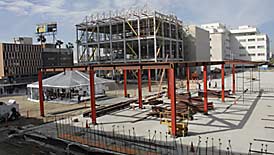Contra Costa Times article
http://www.contracostatimes.com/mld/cctimes/16938763.htm
Protestors Blockade Chevron HQ’s in San Francisco

By Sophia Kazmi
CONTRA COSTA TIMES
Public protests in San Ramon and Lafayette on Monday slowed traffic and galvanized opinions on the fourth anniversary of the start of the war in Iraq.
In San Ramon, traffic on city streets and northbound Interstate 680 slowed to a crawl when protesters brought their message to the gates of oil giant Chevron’s headquarters in Bishop Ranch. And Monday evening in Lafayette, an estimated 350 people attended an anti-war rally at the crosses display. Both events were peaceful.
In San Ramon, dozens of people stood for about four hours outside Chevron’s gates, denouncing its interest in the Iraq war and the company’s alleged destruction of the climate and the environment around the world.
“We came here to hold Chevron accountable for their actions,” said Joshua Russell of Oakland, a member of the Bay Rising Affinity Group.
Some protesters carried signs, others were chained to black oil drums painted with statements such as “Stop the Iraqi oil theft.” Some sang, others wore giant heads of President Bush and Vice President Dick Cheney.
Protesters were angry about a draft oil revenue law being discussed in Iraq’s parliament that could allow foreign investment in Iraq by allowing regional oil companies to sign with foreign oil companies for exploration and development. Many said this law would reduce the control the country has on its oil fields and that foreign companies would not have to hire Iraqi companies or Iraqi workers.
Iraqis “need to take whatever is theirs,” said Sureya Sayadi of San Ramon. “It’s not for America to decide. It’s not for Chevron to get.”
The peaceful group — no arrests were made Monday — also took on global warming, saying companies such as Chevron are not doing enough to stop it. And, fast forwarding to the future, protesters held a funeral procession for earth’s last piece of ice.
Chevron spokesman Kent Robertson said Chevron is not involved in Iraqi oil production; rather, it is providing technical assistance in developing that country’s oil industry.
Chevron issued a short statement about Monday’s protest, saying it “strongly supports anyone’s right to express their opinions,” and adding, “Around the world Chevron has an excellent reputation as a company that operates responsibly while producing critical products that improve people’s lives.”
About 20 police officers watched the crowd, mostly to ensure the safety of the protesters, said Jimmy Lee, Contra Costa sheriff’s spokesman.
By the end, protesters said they had a successful day and felt as though they had made a difference.
“We were able to disrupt a day at Chevron headquarters, and none of us are going to jail,” Russell said.
Things got more heated in Lafayette, where an evening vigil to remember war dead attracted at least 350 war protesters and supporters who verbally sparred at the hillside of crosses that has become a symbol for the country’s divided views.
Both sides tried to drown the other out, with supporters of the Iraq mission hollering “Shame on you” and protesters countering with “Shame on Bush.”
“Thank God for those men and women who are willing to put it on the line,” said Lafayette resident Charles Haig to cross supporters. Haig’s son, David, is serving in Iraq.
Cross organizer Jeff Heaton, who stepped up to a microphone amid shouts of “traitor,” said soldiers’ deaths “will not be in vain if we see to it that their deaths and injuries inspire us to change the course of history.”
The names of soldiers on crosses, which had been a source of friction at a March 8 rally, were removed this past weekend. A few remained in cases where families requested it.
Staff writers Katherine Tam and George Avalos and the New York Times contributed to this story. Reach Sophia Kazmi at 925-847-2122 or skazmi@cctimes.com.
12:49 PM – 0 Comments – 0 Kudos – Add Comment





